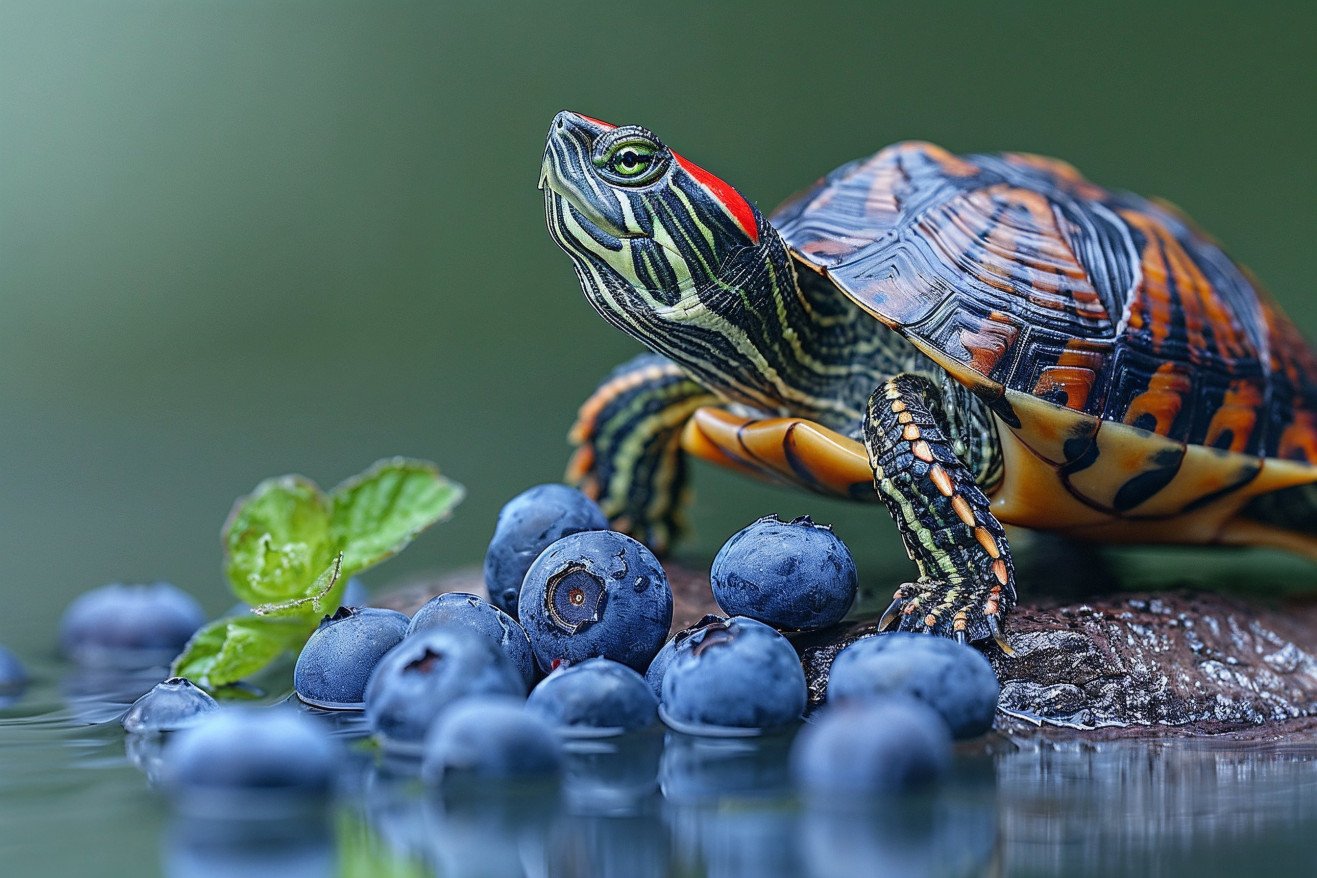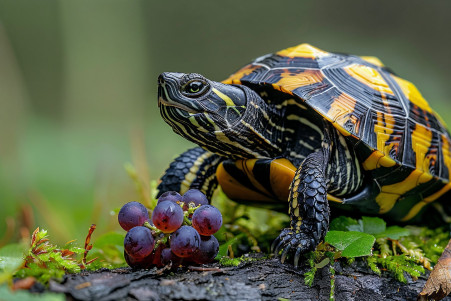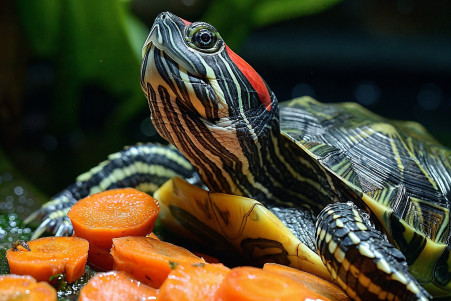Can Turtles Eat Blueberries? What Pet Owners Need to Know
12 June 2024 • Updated 11 June 2024

Given their affinity for a variety of fruits and vegetables, you may be tempted to share some of your delicious, juicy blueberries with your turtle. While turtles can eat blueberries, they should only be given as an occasional treat. Turtles eat a diet that is mostly made up of plants, and because of this, they can't handle a lot of sugar at once, even if it's from a natural source like fruit.
In this article, we'll take a look at the latest information from veterinary nutritionists and experienced reptile owners to help you understand the best way to give your turtle the occasional blueberry. We'll find out how much they can eat, what to watch out for, and what other options are available that will give your turtle the nutrients they need while still allowing them to enjoy a treat.
Can turtles eat blueberries?
Nutritional Value of Blueberries for Turtles
Blueberries contain a wide range of vitamins, minerals, and antioxidants that can offer some nutritional advantages when fed in moderation to turtles. The vitamin C in blueberries can help turtles maintain a healthy immune system and skin and shell health, according to PetKeen's team of veterinarians. Blueberries are also high in fiber, which can help turtles with digestion and weight management when given in the right amounts.
The antioxidants in blueberries, including anthocyanins, can help turtles fight oxidative stress and age-related ailments, according to AnimalTrove's research. That said, it's worth noting that the calcium-to-phosphorus ratio in blueberries is not ideal for turtles, as PetKeen points out. That said, because blueberries should only be a small part of a turtle's diet, the ratio is less of a concern.
While blueberries can offer some nutritional advantages, it's important to remember that they should be fed in moderation. They should be used as an occasional treat to a well-rounded, nutrient-dense diet that's primarily made up of protein and leafy greens. By making sure to feed turtles the right amounts, their owners can help them enjoy the taste of blueberries while ensuring they stay healthy and happy.
How to Serve and Portion Blueberries for Turtles
Blueberries can be given to turtles as a treat, but only once or twice a week, according to Hepper. The portion size will vary depending on the size of the turtle, but in general, a few blueberries or a tablespoon is a good portion size.
To avoid choking, blueberries should be washed and cut into smaller pieces before serving, according to AnimalTrove. It's also important to add blueberries to your turtle's diet slowly to make sure they don't have any adverse reactions, according to the experts.
Frozen blueberries are an option, but according to the Redearslider.com forum, freezing blueberries may cause a slight loss of nutrients. However, if thawed, frozen blueberries are still safe and healthy for turtles when served in the right portion sizes.
Potential Dangers and Safety Measures
Although it is uncommon, some turtles may be allergic to blueberries, and the signs of an allergic reaction can include mouth/throat irritation, hives, or swelling, according to Wyndly. Overconsumption of blueberries or other fruits can result in obesity, gastrointestinal upset, and other health issues in turtles, according to the team at VCA Animal Hospitals.
The high sugar content in blueberries can also lead to tooth decay and other dental problems if they are consumed in excess. Blueberries should not be given to a turtle that is already dealing with gastrointestinal issues or other health problems. It’s also important to store and handle blueberries properly to prevent them from going bad and becoming contaminated with bacteria, as outlined in the advice from Against All Grain.
By being aware of these potential dangers and making sure to practice portion control and proper food safety, turtle owners can feel comfortable giving their pets the occasional blueberry as a special treat in their healthy diet.
Types of Turtles and Blueberry Consumption
According to the turtle experts at Turtle OMG, most popular pet turtle species, including red-eared sliders, painted turtles, and box turtles, can eat blueberries in moderation. Aquatic turtles and semi-aquatic turtles are more likely to be able to eat fruit, including blueberries.
Some tortoises, like the gopher tortoise, eat blueberries in the wild, but The Tortoise Table warns that blueberries should not be a large part of their diet in captivity. Turtles with special dietary needs or other health concerns may not be able to eat blueberries, or they may only be able to eat them in small amounts, so it's important to talk to a reptile vet or experienced turtle owner to get advice on what to feed your turtle.
How to Keep Blueberries for Turtles
Fresh blueberries can be kept for up to 10 days in the refrigerator if they are washed in a vinegar solution, dried thoroughly, and stored in a clean container lined with paper towels, says Against All Grain. The vinegar solution is important because it kills any mold that may be present and cause the blueberries to spoil faster.
If you want to keep blueberries for a longer period of time, you may want to consider freezing them. When properly frozen and vacuum-sealed, frozen blueberries can last for 1-3 years, according to The Cross Legacy. To freeze blueberries, the article suggests laying them out on a tray and freezing them individually before transferring them to a freezer bag or container.
It is important to note that blueberries should never be stored at room temperature, as this can cause them to spoil faster and potentially become contaminated with bacteria. The Cross Legacy also recommends throwing away any blueberries that have visible mold, are too soft, or smell bad, as they may not be safe for turtles to eat.
By keeping these storage and preservation tips in mind, turtle owners can make sure their pets can eat blueberries safely as an occasional treat while minimizing the risk of foodborne illness or other health issues.
Conclusion: Everything in Moderation
While turtles can eat blueberries, they should only be given to them as an occasional treat. Instead, their regular diet should be made up of healthy vegetables, proteins, and calcium. Turtle OMG explains that while blueberries can offer some health benefits, they are high in sugar and should only account for about 5% of a turtle's diet.
To make sure that you're feeding your turtle blueberries in a safe and responsible way, you'll want to make sure you're feeding them the right portion size, preparing them properly, and storing them correctly. Pet Keen and AnimalTrove can help you understand how to do this. It's also important to talk to a reptile vet or an experienced turtle owner to learn about the best way to feed your turtle based on its species.
If you follow these guidelines and make sure that you're feeding your turtle blueberries in moderation, you can ensure that your turtle has a well-rounded and enjoyable diet.


